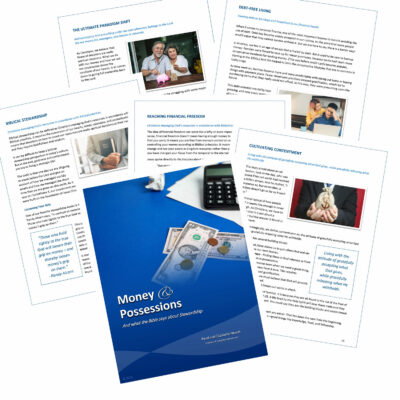“…I have learned to be content in whatever circumstances I am. I know how
to get along with humble means, and I also know how to live in prosperity;
in any and every circumstance I have learned the secret of being filled and
going hungry, both of having abundance and suffering need. I can do all
things through Him who strengthens me.”
Philippians 4:11‐13, NASB
What will bring you true and lasting happiness? Among the many supposed answers to that question you will find some of Satan’s favorite lies.
From the beginning, humans were created to want things—good things, like knowledge, food, and fellowship. Those desires motivate us to learn, work, and love our neighbors, but we run into trouble when our desires get focused on the wrong objects. Adam and Eve listened to the serpent’s lie that they would find ultimate fulfillment in the forbidden fruit (Gen. 3:6). In today’s age, the advertising industry carries the same message twenty‐four‐seven on more than 200 channels (in high definition, no less).

How should a Christian respond to both the cultural and internal drive to want, want, want? How can we find true and lasting happiness? The answer is contentment.
Contentment is the attitude of gratefully accepting what God gives, while gracefully releasing what He withholds. Notice Paul’s “secret” to contentment in Philippians 4:13: “I can do all things through Him who strengthens me.” Let’s look a little closer into how Christ enables us to be content in all situations.
Contentment has several building blocks:
- Love – allows us to put others first and de‐emphasize our own desires
- Joy and Peace – finding these in God releases us from seeking them in possessions
- Patience – because even when we want a good thing, we can’t always have it now
- Faith – believing that God will provide what we need
- Self‐control – to keep our wants in check
If those character traits sound familiar, it’s because they are all found in the fruit of the Spirit (Gal. 5:22‐23). A life lived in the Holy Spirit will bear those traits, and those traits collectively result in contentment. They are the building blocks and contentment is the house. They are the fruit and contentment is the fruit salad. That’s all well and good, you may be thinking, but it doesn’t make contentment any easier. That’s true. Contentment, like any other worthwhile character trait, takes practice. In the practice of contentment, here are a few helpful tips:
- Contentment does not mean avoiding money. Money is not the root of all evil; the love of money is what gets people into serious trouble (I Timothy 6:10, Heb. 13:5).
- God knows you need certain things to survive. He promises that if you make the kingdom of God your top priority, then God will supply what you need (Matt. 6:31‐34).
- Contentment is not an excuse for laziness. The Bible teaches that we should work hard and plan for the future (Prov. 6:6‐8). It also teaches that prosperity is the typical result of hard work (Prov. 21:5). However, scripture balances these teachings with the warning that peace and joy should not be sacrificed to gain wealth, which is fleeting (Prov. 23:4‐5).
Christian financial advisor Ron Blue summarizes contentment this way:
“No financial principle can have a greater impact on you or free you up more than this truth: Money is not the key to contentment! Contentment has everything to do with your relationship with God and nothing to do with your money. Once you are free from the love of money and the pursuit of it, you can have a lot or a little and be content all the same. At that point you have learned the secret to contentment.”
Digging Deeper
Read Exodus 20:17 (the last of the Ten Commandments). Why is this commandment necessary and how does it differ from the rest of the Ten Commandments?
King Solomon, perhaps more than any other person in history, had it all. Read Ecclesiastes 2:1‐11. What was Solomon’s response after attaining everything the world had to offer?






